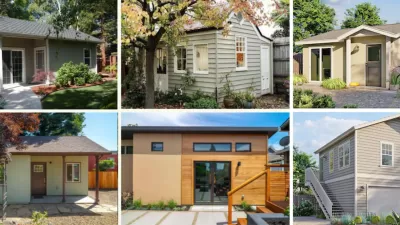One resident argues that adding a unit for long-term rental is too expensive and difficult, especially when compared to the city’s ‘super easy’ process for permitting a short-term or vacation rental.

Despite the city’s housing affordability crisis and official pledges to support increased housing production, one Seattle resident found that the process of converting his basement to an apartment for long-term renters is “painful, expensive, and risky,” unlike the “super simple” process for adding a short-term rental unit, a practice that many housing advocates blame for reducing the supply for long-term renters.
Writing on his experience in the Seattle Times, Eric Fisk notes that “For a short-term rental on your property there are no city inspections or standards for renting out your space beyond a minimal cost for registering with the city.” (According to the city’s website, some STRs, such as those that are not the owner’s primary residence or are a dedicated unit, are required to comply with the Rental Registration and Inspection Ordinance). However, adding an Attached Accessory Dwelling Unit (AADU) for long-term rental is trickier. For example, “One critical rule is that you cannot put tenants in a finished garage space if you are in a single-family zone, even if removing that parking would create new on-street parking in front of your driveway.”
According to Fisk, this has led to a huge imbalance in short-term and long-term rentals in Seattle, with only around 1,000 AADUs built since the city passed its Housing Affordability and Livability Agenda in 2016.
Fisk suggests several ways to remedy the situation, including closing the regulatory gap, waiving parking requirements for certain single-family homes, eliminating permitting fees, and providing more resources to homeowners who want to convert parts of their homes to AADUs.
FULL STORY: If Seattle cares about affordability, why does it make it so hard to add basement apartments?

Planetizen Federal Action Tracker
A weekly monitor of how Trump’s orders and actions are impacting planners and planning in America.

Congressman Proposes Bill to Rename DC Metro “Trump Train”
The Make Autorail Great Again Act would withhold federal funding to the system until the Washington Metropolitan Area Transit Authority (WMATA), rebrands as the Washington Metropolitan Authority for Greater Access (WMAGA).

The Simple Legislative Tool Transforming Vacant Downtowns
In California, Michigan and Georgia, an easy win is bringing dollars — and delight — back to city centers.

The States Losing Rural Delivery Rooms at an Alarming Pace
In some states, as few as 9% of rural hospitals still deliver babies. As a result, rising pre-term births, no adequate pre-term care and "harrowing" close calls are a growing reality.

The Small South Asian Republic Going all in on EVs
Thanks to one simple policy change less than five years ago, 65% of new cars in this Himalayan country are now electric.

DC Backpedals on Bike Lane Protection, Swaps Barriers for Paint
Citing aesthetic concerns, the city is removing the concrete barriers and flexposts that once separated Arizona Avenue cyclists from motor vehicles.
Urban Design for Planners 1: Software Tools
This six-course series explores essential urban design concepts using open source software and equips planners with the tools they need to participate fully in the urban design process.
Planning for Universal Design
Learn the tools for implementing Universal Design in planning regulations.
Smith Gee Studio
City of Charlotte
City of Camden Redevelopment Agency
City of Astoria
Transportation Research & Education Center (TREC) at Portland State University
US High Speed Rail Association
City of Camden Redevelopment Agency
Municipality of Princeton (NJ)





























